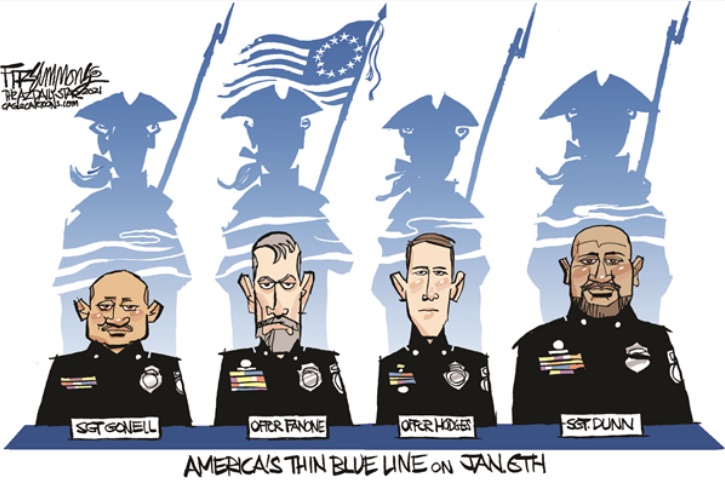Officers Encountered Racism While Defending Against an Insurrection
Racial Justice Is Key to Addressing the Harm of the January 6 Insurrection

Since the January 6 Insurrection, our nation has been stunned by videos, images, and accounts of one of the most devastating days of our history. A violent mob descended on the Capitol with the intent of overturning a democratic election — an election that effectively had racial justice on the ballot. Insurrectionists with Confederate flags walked through the halls of Congress, Black police officers were called the N-word, and a noose was set up on the grounds of the Capitol. Months later, some members of Congress are downplaying the severity of this moment.
As U.S. Capitol and D.C. Metropolitan police officers addressed the House Select Committee on the January 6 attack on Tuesday, I thought of the significance of this day from a different angle than I had previously considered. Hearing the heroic stories of people on the front lines of defending our democracy, I recognized that these brave officers were describing the harm that white nationalism had caused to members of law enforcement, members of an institution with a long legacy of systemic racism.
I recently read Heather McGhee’s groundbreaking book The Sum of Us: What Racism Costs Us and How We Can Prosper Together. McGhee argues that systemic racism has not only harmed Black and brown communities, but that it has harmed all Americans and the very institutions that perpetuate racism. McGhee provides numerous examples of how all aspects of public and private life have suffered as a result of racist practices and policies. This first committee hearing provided a clear example of McGhee’s argument. The systemic racism that has influenced policing practices and justice policies doesn’t just harm Black and brown communities, it harms the law enforcement officers who take an oath to defend the Constitution, as well.
At the same time that our nation is reckoning with the unfinished business of the January 6 Insurrection, we are just scratching the surface of creating a more fair and equitable system of criminal justice and policing. After more than a year since the murder of George Floyd, Congress has yet to pass a police reform bill. As violent crime is increasing in big cities throughout the nation, some Democrats who have championed the cause of racial justice are tempted by muscle memory to revert to tough-on-crime policies — policies that have disproportionately harmed Black and brown communities.
In confronting these multiple crises, our federal leaders have an opportunity to chart a different course by standing up to the forces of systemic racism that have contributed to the conditions for an insurrection, the breakdown of trust between the justice system and communities of color, and the public safety issues that exist in communities that have been marginalized.
Our Democratic leaders should double down on a message of advancing racial equity, justice, and safety for all. Since the murder of George Floyd, many Democratic leaders have vowed to make sure that this moment doesn’t pass by without systemic change. Now is a great time to act. In addition to increasing accountability for police use of force, our leaders are in a good position to pass policies that reduce the use of incarceration, empower state and local governments to create alternative response programs for nonviolent and mental-health related calls, and prioritize measures that actually prevent violent crimes in neighborhoods that have been left behind by deliberate policy choices. These actions complement the work of holding the insurrectionists accountable, as all of these efforts help advance racial justice.
As Dr. King taught us, “Injustice anywhere is a threat to justice everywhere.” Rooting out systemic racism in our justice system is not only critical for supporting our Black and brown communities, but also for creating a system for responding to harm that can have the trust and confidence of all Americans. To realize our nation’s promise that all are created equal, and to respect the police officers who answered the call to save our democracy, now is the time for an unrelenting commitment to righting the wrongs of systemic racism in public policy. It’s for the benefit of us all.
Ethan Bertrand is a director of the Isla Vista Community Services District, an advocate for criminal justice reform, and a student of political science at the University of California, Santa Barbara. Opinions are his own.



